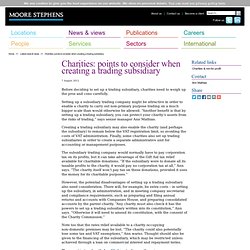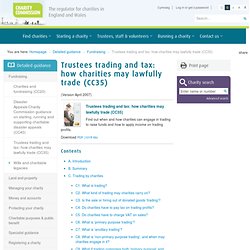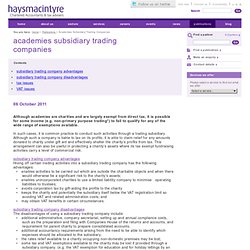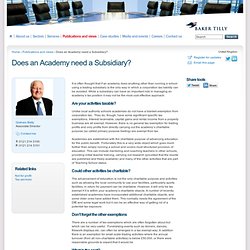

Planning an Online Course. Whilst searching for some resources on planning and designing online courses I came across this excellent brainstorming ‘sketchnote’ (I’ll write more about these another time) from Giulia Forsythe called ‘planning your online course’.

Take some time to look at this in detail, there’s a lot here for you (click to enlarge it). Image source: Planning your online course (CC BY-NC-SA 2.0) Moore Stephens - Charities: points to consider when creating a trading subsidiary. 7 August 2012 Before deciding to set up a trading subsidiary, charities need to weigh up the pros and cons carefully.

Setting up a subsidiary trading company might be attractive in order to enable a charity to carry out non-primary purpose trading on a much bigger scale than would otherwise be allowed. “Another benefit is that by setting up a trading subsidiary, you can protect your charity’s assets from the risks of trading,” says senior manager Ann Mathias. Creating a trading subsidiary may also enable the charity (and perhaps the subsidiary) to remain below the VAT registration limit, so avoiding the costs of VAT administration.
Finally, some charities also set up trading subsidiaries in order to create a separate administrative unit for accounting or management purposes. The subsidiary trading company would normally have to pay corporation tax on its profits, but it can take advantage of the Gift Aid tax relief available for charitable donations. Trustees trading and tax: how charities may lawfully trade (CC35) (Version April 2007) Contents A.

Introduction A1. This guidance This guidance explains when and how charities may engage in trading. The present guidance also contains some basic information on the application of income and corporation tax on trading profits, as this is a significant factor in determining the sort of organisational structures which should be adopted by charities to carry on a trade for fundraising purposes. Detailed information on the taxation of trading profits earned by charities can be obtained from www.hmrc.gov.uk, the website of HM Revenue & Customs (‘HMRC') – see the Trading and business activities guidance within the Detailed Guidance notes for Charities section which deals with charities .
A2. In this guidance, where we use the word 'must', we mean that the Commission's understanding is that there is a specific legal or regulatory requirement affecting trustees or a charity. Symbol next to the short answer in that section. A3. A4. This guidance has two main parts. Academies Subsidiary Trading Companies. 06 October 2011 Although academies are charities and are largely exempt from direct tax, it is possible for some income (e.g. non-primary purpose trading*) to fail to qualify for any of the wide range of exemptions available.

In such cases, it is common practice to conduct such activities through a trading subsidiary. Although such a company is liable to tax on its profits, it is able to claim relief for any amounts donated to charity under gift aid and effectively shelter the charity’s profits from tax. This arrangement can also be useful in protecting a charity’s assets where its tax exempt fundraising activities carry a level of commercial risk. Hiving off certain trading activities into a subsidiary trading company has the following advantages: • enables activities to be carried out which are outside the charitable objects and when there would otherwise be a significant risk to the charity’s assets; • avoids corporation tax by gift-aiding the profits to the charity.
Does an Academy need a Subsidiary? It is often thought that if an academy does anything other than running a school using a trading subsidiary is the only way in which a corporation tax liability can be avoided.

While a subsidiary can have an important role in managing an academy’s tax position it may not be the most cost effective approach. Are your activities taxable? Unlike local authority schools academies do not have a blanket exemption from corporation tax. They do, though, have some significant specific tax exemptions. Interest receivable, capital gains and rental income from a property business are all exempt. Academies are established with the charitable purpose of advancing education for the public benefit. Could other activities be charitable? The advancement of education is not the only charitable purpose and activities such as allowing the local community to use your facilities, particularly sports facilities, in return for payment can be charitable.
Don’t forget the other exemptions What is the cost?